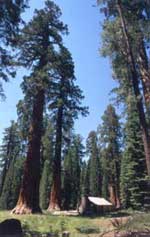 |
||||||||||||||||||||||||||||||||||||||||
|
||||||||||||||||||||||||||||||||||||||||
| info@iwood.ch | ||||||||||||||||||||||||||||||||||||||||
|
Forest
maintenance in change
Historically, forests have been a vital strategic factor for rulers, with enormous significance in terms of sea voyaging and political power. They were just as important in the early industrialisation of Europe, in the meaning of ores and as providers of firewood to the growing cities – phenomena which can still be observed all over the world today. However, over the last two hundred years or so in Europe, people have progressed from simply using forests to caring for them and "managing" them.
The
first thing Europeans had to learn was that a forest is more than
just a group of trees planted together. Planting monocultures (single-species
plantations), often of non-local species, leads to major forest
management problems which entail high levels of investment in terms
of both technology and personal. Nowadays forest managers generally
try to plant mixed forests and to avoid totally deforesting large
areas (which places an excessive strain on the soil and the plant
and animal life of the forest). The relatively recent trend of wood
certification can be seen as a reaction to global debates on forest
use, biological diversity and monocultures. The world-leading system,
which has becoming generally accepted, is the FSC (Forest Stewardship
Council) with its four certification systems for natural forests,
based on assessment of the forest management on site. The aim of
the certification is to promote sustainable forest management and
to learn from previous experiences by applying a gentle pressure
on the market side of the equation. Work has been in progress on
developing standards for certification in the Swedish timber industry
since 1996, under the auspices of the FSC. Similar developments
are under way in Finland, Norway, Cameroon and Brazil. By 1998 some
9 million hectares of woodland was certified according to FSC standards. As well as the FSC, the Canadian Standards Organisation founded the Sustainable Forest Management (SFM) project in 1994. The SFM follows the ISO 14001 environmental management system. This system solely evaluates the forest management system, and only for a particular defined area. This has the significant disadvantage that it cannot result in a product labelling system.
|
|||||||||||||||||||||||||||||||||||||||
